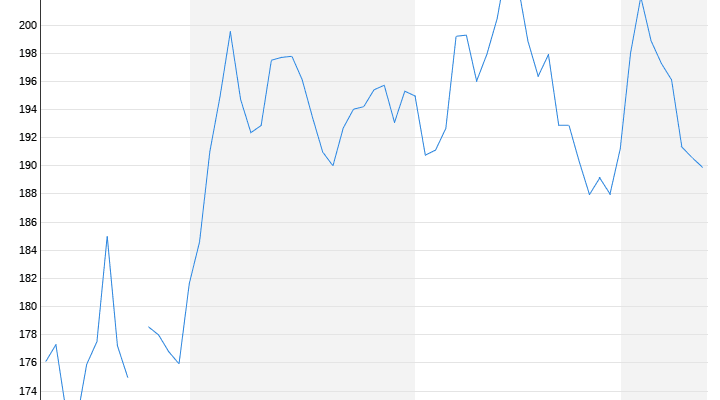Nevertheless nervousness in the market
Wall Street is stabilizing again
03/13/2023 9:46 p.m
The bankruptcy of the Silicon Valley Bank continues to shape the international markets. Fears spread, prices fell. This also has an impact on speculation about the key interest rate. The aircraft manufacturer Boeing made only a small price gain after the announcement of a major order.
Wall Street closed inconsistently on Monday after an extremely volatile course. In view of the main topic, the collapse of the Silicon Valley Bank, traders spoke of a high level of nervousness on the market – which can be seen from the pronounced volatility. Ultimately, the measures introduced provided some calm and closing prices well above the daily low, because the regulatory authorities want to limit the effects in the banking sector.
The Dow Jones Index lost 0.3 percent to 31,819 points, the S&P 500 lost 0.2 percent and the der Nasdaq Composite rose 0.4 percent. The 923 (Friday: 431) course winners faced 2,148 (2,659) losers. 67 (69) titles closed unchanged.
Treasury Department, Federal Reserve and US Deposit Insurance guaranteed all deposits of the Silicon Valley Bank. And even US President Joe Biden stepped in and stressed the security of the US banking system, citing the actions taken. “These measures may be enough to contain some of the current turmoil in global markets, which is being driven by smaller US banks. However, it should be noted that these problems have largely arisen from the Fed’s overly dovish policy stance over many years and are now being triggered by excessive tightening,” said market strategist David Kelly of JP Morgan Funds.
The SVB had collapsed after an attempt to raise capital led to a run on the bank. Regulators also announced that they are taking control of the Signature Bench have taken over, which serves many cryptocurrency companies. With a discount of 7 percent, the US banking sector clearly brought up the rear of the industry – the prices of smaller regional banks in particular collapsed. “The collapse of the SVB has the potential to shake confidence in the banking sector, particularly in the smaller banks,” said investment strategist Jasmine Duan of RBC Wealth Management Asia.
US interest rate speculation weighs on dollar
On the bond market, traders spoke of a flight to supposed safety, but also of pricing out interest rate hike speculation. Because the crisis in the banking sector should slow down the Fed in its rate hike cycle, it said. Prices shot up and sent yields plummeting. Goldman Sachs economists were no longer assuming that the Fed would hike rates at its March meeting. Previously, they had expected a quarter-point hike. However, they still expect rate hikes in May, June and July, ultimately taking the US federal funds rate to 5.25 to 5.5 percent.
With the massive drop in market interest rates, the dollar index up 0.9 percent and weakened against the major currencies as the Fed’s measures to support the banking system raised questions about the pace of future rate hikes. Falling market interest rates and a weak dollar drove the gold price. The oil prices came under pressure. With the SVB Bank crisis and concerns about the risk of contagion in the banking system, risky investments such as oil were not in demand. Demand is likely to suffer in a banking crisis because the economy could stall, it said.
Bank values continue to fall
Bank stocks were weak, so fell Goldman Sachs and JP Morgan by 3.7 and 1.8 percent respectively. The titles of some smaller institutes fell dramatically, for example broke Western Alliance by 47 percent, Pacwest Bancorp by 21 percent, First Republic Bank by 62 percent and Metropolitan Bank by 43.8 percent.
The aircraft manufacturer Boeing is facing a major order from Saudi Arabia. Two Saudi airlines are about to order a total of 78 787 Dreamliners, people familiar with the matter said. There would also be an option for 40 more aircraft. The course gained 0.1 percent.
Pfizer increased by 1.9 percent. The pharmaceutical company strengthens its oncology portfolio with the acquisition of the biotechnology company Seagen. Pfizer agreed to take over Seagen for $43 billion. Seagen shot up 14.5 percent.
The French pharmaceutical company Sanofi swallows the US biopharmaceutical company Provention Bio for around 2.9 billion dollars, Provention Bio advanced by almost 260 percent.
